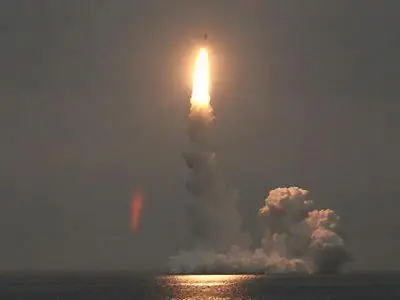- Author Matthew Elmers elmers@military-review.com.
- Public 2023-12-16 21:49.
- Last modified 2025-01-24 09:17.

According to the former head of the press service of the Ministry of Defense, military observer Viktor Barantz, the Russian authorities hastened to adopt the Bulava missile system for the Russian naval strategic nuclear forces. The expert said that with his statements on how the missile will be delivered to the army, Nikolai Makarov, Chief of the General Staff, caused a “horse neighing” from the specialists. At the same time, other military analysts disagree with Baranets, who criticizes the haste of the Bulava decision.
The forthcoming adoption of the Bulava missile system into service with the Russian army was announced by Alexander Sukhorukov, the first deputy minister of defense of the Russian Federation. According to him, Russian President Dmitry Medvedev has already prepared a corresponding decree.
Baranets said that since the creators of the Bulava initially embarked on an adventure, seeking to unify the Topol land-based complex to the naval missile system, problems immediately began with the missile. The reason for this, in his opinion, was constructive flaws, which were aggravated by the "human factor". However, Chief of the General Staff Nikolai Makarov, when commenting on the launch failures last weekend, referred to the "human factor". He said that, to a greater extent, the reasons for the failed missile tests "lay in the human factor, where a person did his job unprofessionally."
As a result, the Bulava missile was never properly modified, and now, according to the military expert, it may “fly in the wrong direction or not fly at all”. Baranets noted with bitter irony that the Russian fleet would fear the Bulava more than the foreign one.

Recall that tests of the Bulava missile system, which was developed by scientists from the Moscow Institute of Thermal Engineering, began in 2004 and went unsuccessfully for a long time. The rocket was launched from the Yuri Dolgoruky and Dmitry Donskoy submarines - from the underwater and surface positions. After the fifth unsuccessful launch, during which the rocket self-destructed in the twentieth second of the flight, Yuri Solomonov, who had previously been the director and general designer of the development institute, resigned.
The changes have come since 2010, when there have been several successful launches in a row. Of the 18 completed Bulava launches, 11 were successful according to the planned scenario.
In December last year, the last salvo launch of Bulava missiles from the Yuri Dolgoruky nuclear submarine from the White Sea took place. After that, Russian President Dmitry Medvedev made a statement on the adoption of the missile into service, without naming, however, the exact dates.
Earlier, the Ministry of Defense reported that submarines of the Borey project, which are equipped with Bulava, will enter service with the Russian Navy this summer.
According to Viktor Barantz, the Bulava missile system is in a hurry to be put into service before the presidential elections, since the employees of the Ministry of Defense are afraid of losing their posts after the arrival of the new head of state. The military analyst said that the Bulava story is a pure gamble dictated by the pre-election conditions, and the fact that in such an electoral atmosphere some ministers, designers, admirals seek to consolidate their positions so that the new Russian authorities do not punish this story. The expert said that the head of the General Staff even went so far as to say that the rocket would be introduced in parts, which caused a "horse neighing" in the ranks of specialists. At the same time, Baranets added that the missile is "raw" and in this form it will pose more of a threat to the Russian army itself than to the enemy's armed forces.
At the same time, Vladimir Yevseev, an expert on missile weapons, disagrees with Barantz's opinion. He believes that if you approach the preparation with all responsibility, then there is nothing to be afraid of. According to Yevseyev, it is impossible not to put the Bulava missile system into service with the Russian army, since 2 submarines of the Borey type, for which the missile was developed, remain unarmed to this day.
According to the expert, the most serious problems with the Bulava have been resolved, as evidenced by a series of successful launches. The remaining minor flaws can be overcome with proper missile tracking. And for this it is necessary that the representatives of the developer were on the submarine, which is equipped with the Bulava, for some time.






